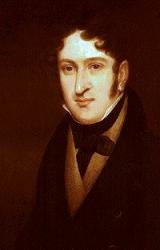
1796 - 1889 Hymnal Number: 112 Author of "What grace, O Lord, and beauty shone" in Songs for the Lord's House Denny, Sir Edward, Bart . Sir Edward Denny, son of Sir E. Denny, 4th baronet, of Tralee Castle, County of Kerry, was born 2 Oct., 1796, and succeeded his father in August, 1831. He is a member of the Plymouth Brethren, and has contributed largely to their hymnody. His first publication, in which many of his hymns appeared, was A Selection of Hymns, Lond. Central Tract Depot, 1839. This was followed by Hymns & Poems , Lond., 1848 (third ed., 1870). He has also published several prose works. Many of his hymns are popular, and are in extensive use as:—" A pilgrim through this lonely world"; "Bride of the Lamb, rejoice, rejoice"; “Bright with all His crowns of glory"; “Light of the lonely pilgrim's heart”; "Sweet feast of love divine," and several others. In addition to these, which are separately annotated, and those which are confined in their use to the congregations of the "Brethren," there are also nearly 20 in limited use in Great Britain and America.
Of these the following appeared, first in his Selection of Hymns, 1839; then, in the Appendix to Hymns for the Poor of the Flock, 1841; and then in his Hymns & Poems, 1848-70 :—
1. Break forth, 0 earth, in praises. Praise for Redemption. This is given in several collections in Great Britain and America.
2. Children of God, in all your need. The Great High Priest. In limited use.
3. Children of light, arise and shine. Looking unto Jesus. In numerous hymnals in G. Britain and America.
4. Children of light, awake, awake. Advent . This hymn is an application of the Parable of the Ten Virgins to the Second Coming of Christ.
5. Dear Lord, amid the throng that pressed. The Holy Women at the Cross. The use of this hymn in America is somewhat extensive.
6. Hope of our hearts, 0 Lord, appear. The Second Advent desired. In the Hymns for the Poor of the Flock, 1837; and the author's Hymns & Poems, 1848-60, and various collections in Great Britain and America.
7. Joy to the ransomed earth. Jesus the King. Its use is limited.
8. Lo 'tis the heavenly army. The Second Advent. The original of this hymn is in 4 stanzas of 10 lines and as such it is usually given: but in the Peoples Hymnal, 1867, it is arranged in 4 stanzas of 8 lines, and is also slightly altered.
9. 0 grace divine! the Saviour shed. Good Friday. In limited use.
10. 0 what a bright and blessed world. The New Earth. This hymn is based upon Gen. v. 29, as interpreted from a Millennial point of view. Christ is regarded as the Rest (Noah-Rest) of His people, and the remover of the curse from the earth.
11. Sweet was the hour, 0 Lord, to Thee. Christ at the Well of Sychar. Limited in use.
12. Thou vain deceitful world, farewell. Forsaking the World for Christ. In several collections.
13. Through Israel's land the Lord of all . Mission to the Jews. In addition to its use in its full form, it is also given as: "O Zion, when thy Saviour came," as in Dr. Walker's Psalms & Hymns, 1855-71; Snepp's Songs of Grace & Glory, and others. This opens with stanza ii.
14. 'Tis finish'd all—our souls to win. Jesus the Guide and Friend. In several collections.
15. 'Tis He, the Mighty Saviour comes . Missions . Given in Snepp, and one or two others.
16. 'Tis night, but O the joyful morn. Hope. In a few hymnals; also, beginning with stanzas ii., "Lord of our hearts, beloved of Thee," in Dr. Hatfield's Church Hymn Book, N. Y., 1872.
17. To Calvary, Lord, in Spirit now. Good Friday. This is given in several hymnals, including Spurgeon's Our Own Hymn Book, 1866, &c.
The next is in the Selection of 1839, and the Hymns & Poems, 1848-70:—
18. 0 Blessed Lord, Thy feeble Sheep. The Good Shepherd. Its use is limited.
The three with which we close are from J. G, Deck's Psalms & Hymns, 1842, Pt. ii., and the Hymns & Poems, 1848-70:—
19. Hark to the trump! behold it breaks . The Resurrection . The design of this hymn is thus described, by the author: "These lines are supposed to be the utterance of the saints at the blessed moment when they are actually ascending to meet the Lord in the air, as described in 1 Cor. xv. 51-57 and 1 Thess. iv. 16-18. It is given in several collections."
20. Isles of the deep, rejoice, rejoice. Missions.
21. Where, in this waste unlovely [and desert] world! Rest for the Weary. Its use is limited.
-- John Julian, Dictionary of Hymnology (1907)
=====================
Denny, Sir Edward, Bart., p. 287, ii., died in London, June 13, 1889. Additional pieces from his Selection of Hymns, 1839, are in modern collections including:—
1. O wondrous hour! when, Jesus, Thou. Good Friday .
2. 'Tis past, the dark and dreary night. Easter.
3. While in sweet communion feeding. Holy Communion.
--John Julian, Dictionary of Hymnology, Appendix, Part II (1907)
Edward Denny


 My Starred Hymns
My Starred Hymns





